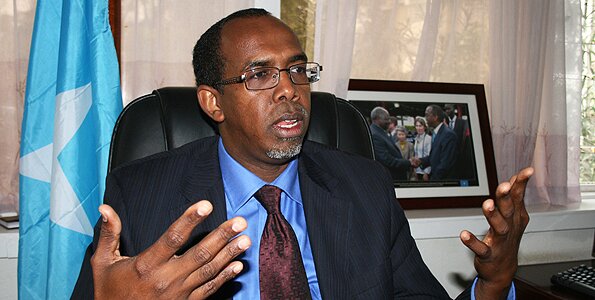
Mohamed Ali Nur Somalia’s Ambassador to Kenya
Bartamaha (Nairobi):- Mohamed Ali Nur, Somalia’s Ambassador to Kenya, probably has the least attractive job in the country. He represents a nation that is overwhelmingly viewed as a burden and possible menace to his hosts.
He has to deal with the latent hostility of the citizens of the host country, while balancing that against the demands of the hundreds of thousands of his countrymen who are in Kenya legally or, in the case of a substantial percentage, illegally.
Yet the diplomat struck an upbeat and businesslike tone in a Sunday Nation interview in which he sought to play up the shared links between Kenya and Somalia and predicted a resolution to the crisis was around the corner.
Mr Nur’s life story has taken in many of the tragedies of his home nation. The American-trained economist was leading a comfortable existence in Mogadishu as an employee of the Central Bank of Somalia before the civil war intensified in 1991.
“We saw the negative effects of war at that time. My own family fled to Kenya before we moved on to America and then to Canada. That is why we do not underestimate the value of our neighbours as we maintain the search for peace in our homeland. Kenyans took us into their homes and welcomed us and we have not forgotten,†said Mr Nur.
The ambassador returned to Nairobi from exile in 2004 as the peace talks between various Somali parties neared conclusion. He took a job with the administration of Prime Minister Mohamed Ali Ghedi before joining a team charged with the task of re-establishing Somalia’s diplomatic mission in Kenya.
But Mr Nur would not have predicted the chaos that would follow the installation of the Transitional Federal Government. His face furrowed and eyes narrowed when asked about the actions of al-Shabaab, which shocked the region and provoked an outpouring of public anger following its July 12 attack on revellers watching the World Cup final in Kampala.
“We are really very sorry for that attack,†he said. “We send our deepest condolences. This is something we suspected might happen but we prayed and hoped it wouldn’t,†he said.
Mr Nur characterised the al-Shabaab militant group as a fringe outfit that was holding the Somali people hostage despite enjoying little public support.
“We are Muslims. Before these people turned up we did not have these types of actions. These suicide bombings and other such are not part of our culture. We are a peace-loving people,†he said.
The envoy supported moves to increase the number of African Union troops in Somalia. He said the mission was initially supposed to have 8,000 troops but currently has between 5,000 and 6,000. Adding to that number would only be in line with the earlier troop levels agreed.
Mr Nur lapsed into diplomatic evasions when asked if he felt neighbouring countries are doing enough to help stabilise his country.
“We appreciate the support we are receiving, but we need more assistance to get to the level the country needs to avoid civil strife,†he said.
The embassy in the Kilimani suburb of Nairobi abounds with dozens of Somali nationals, making it a busy and crowded affair in contrast to the tranquillity you will encounter at most other embassies.
This is a reflection of the fact that its staff’s workload includes dealing with complaints of police harassment of Somali nationals.
“I have told the people that Kenya is a sovereign country which enforces its immigration laws. We all agree that everyone in Kenya should be here legally, but what we object to is the appearance of ethnic profiling targeting one [section of] people,†said Mr Nur.
The Somalia embassy was caught up in controversy in March after a UN report accused officials there of smuggling its nationals to Europe.
They were said to list them in delegations of officials travelling abroad, only for the nationals to melt away when the “government†delegation landed abroad.
Mr Nur dismissed those charges. “The embassy does not issue visas. We are merely facilitators. We are given a list of those travelling and all we do is lodge their applications with other embassies. Those visas are then issued independently.â€
So what are the prospects of peace in Somalia? Mr Nur painted an optimistic picture, saying the vast majority of Somalis want stability. He said the al-Shabaab had created a major humanitarian crisis in Mogadishu and elsewhere and robbed entrepreneurs of the chance to take advantage of Somalis’ famed flair for business.
———————————-
Source:- Daily Nation



